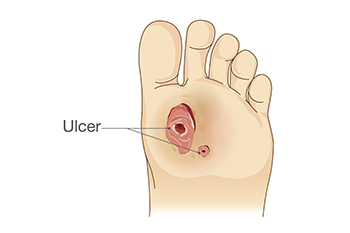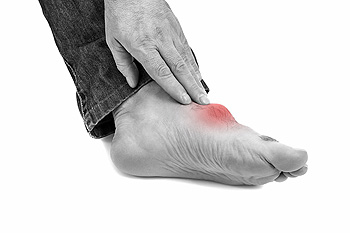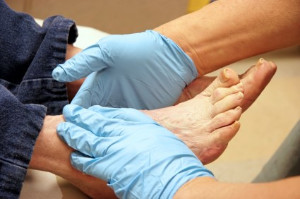Items filtered by date: July 2023
The Seriousness of a Diabetic Foot Ulcer

People who are diabetic are generally concerned about developing a diabetic foot ulcer. Proper wound care treatment is crucial for this type of infection, and serious consequences may ensue if prompt medical attention is not received. Research has shown that approximately 25 percent of diabetic patients will develop a foot ulcer, and implementing prevention techniques may help to avoid this. An essential step for this type of wound care treatment can be to remove the necrotic or dead wound tissue. This is referred to as debridement, and there are various ways to treat this. It is important to reduce any pressure on the wound, and often an off-loading boot is worn. The wound is typically drained, and the healthy underlying tissue is examined. Effective prevention methods can include keeping glucose levels within a normal range, drinking plenty of water daily, and eating healthy foods. If you have a diabetic foot ulcer, it is strongly suggested that you are under the care of a podiatrist who can provide the proper treatment.
Wound care is an important part in dealing with diabetes. If you have diabetes and a foot wound or would like more information about wound care for diabetics, consult with Patrick Bruton, DPM from Big Country foot and Ankle. Our doctor will assess your condition and provide you with quality foot and ankle treatment.
What Is Wound Care?
Wound care is the practice of taking proper care of a wound. This can range from the smallest to the largest of wounds. While everyone can benefit from proper wound care, it is much more important for diabetics. Diabetics often suffer from poor blood circulation which causes wounds to heal much slower than they would in a non-diabetic.
What Is the Importance of Wound Care?
While it may not seem apparent with small ulcers on the foot, for diabetics, any size ulcer can become infected. Diabetics often also suffer from neuropathy, or nerve loss. This means they might not even feel when they have an ulcer on their foot. If the wound becomes severely infected, amputation may be necessary. Therefore, it is of the upmost importance to properly care for any and all foot wounds.
How to Care for Wounds
The best way to care for foot wounds is to prevent them. For diabetics, this means daily inspections of the feet for any signs of abnormalities or ulcers. It is also recommended to see a podiatrist several times a year for a foot inspection. If you do have an ulcer, run the wound under water to clear dirt from the wound; then apply antibiotic ointment to the wound and cover with a bandage. Bandages should be changed daily and keeping pressure off the wound is smart. It is advised to see a podiatrist, who can keep an eye on it.
If you have any questions, please feel free to contact our offices located in Abilene, and Brownwood, TX . We offer the newest diagnostic and treatment technologies for all your foot care needs.
Gout Demystified

Gout is an inflammatory arthritis that occurs due to excess buildup of uric acid crystals that settle in joints and soft tissue. When the body breaks down the naturally occurring substance in the body and from certain foods, called purines, it produces uric acid. Usually, the kidneys excrete excess uric acid through the urine, but if not enough is expelled, it can cause gout. This affliction often begins in the big toe, but it can also affect the heel of the foot. This affliction causes inflammation, pain, and joint stiffness. Some experiencing gout might notice swelling and discoloration of the affected joint. Gout attacks happen unexpectedly, often in the nighttime, and can be intensely painful. It is said that the pain can be so severe that it can be hard to endure the weight of a blanket. A flare can last from a few days to weeks. Gout can be inherited, but males, women of postmenopausal age, those on certain medications, like diuretics, or having other medical conditions, such as diabetes or high blood pressure, are more likely to experience gout. Those who are overweight or eat diets rich in purines, like seafood, red meat, and alcohol, can be at a higher risk of gout as well. If you have extreme pain in your foot, it is strongly suggested that you see a podiatrist for an examination, proper diagnosis, and treatment to help you regain comfort.
Gout is a foot condition that requires certain treatment and care. If you are seeking treatment, contact Patrick Bruton, DPM from Big Country foot and Ankle. Our doctor will treat your foot and ankle needs.
What Is Gout?
Gout is a type of arthritis caused by a buildup of uric acid in the bloodstream. It often develops in the foot, especially the big toe area, although it can manifest in other parts of the body as well. Gout can make walking and standing very painful and is especially common in diabetics and the obese.
People typically get gout because of a poor diet. Genetic predisposition is also a factor. The children of parents who have had gout frequently have a chance of developing it themselves.
Gout can easily be identified by redness and inflammation of the big toe and the surrounding areas of the foot. Other symptoms include extreme fatigue, joint pain, and running high fevers. Sometimes corticosteroid drugs can be prescribed to treat gout, but the best way to combat this disease is to get more exercise and eat a better diet.
If you have any questions please feel free to contact our offices located in Abilene, and Brownwood, TX . We offer the newest diagnostic and treatment technologies for all your foot and ankle needs.
How to Select the Best Running Shoes for You

The available array of running shoes is a positive thing but can be daunting. It is not easy to determine the right pair of running shoes for your feet and your needs. The shoes must fit well and be comfortable. Running shoes have different purposes and are designed to fit the foot of the runner in specific ways. Slight variations can impact one's running experience. Trying them on later in the day, with socks and insoles that will be worn while running, can help ensure a proper fit. Everything above the sole of the running shoe should lay smooth and not bind, chafe, or bunch anywhere. The heel should not slip or irritate the back of the Achilles tendon but should allow for comfortable ankle movement. The way the shoes lace and support the arch should feel secure and allow for the natural doming of the arch while running. The toe box should be wide enough to allow the toes to spread naturally and should not rub against them in any way. The soles of the running shoes should match the running surface and be made of materials that provide traction, stability, and durability, without adding weight or stiffness. The proper shoes should flex or roll in the way the foot moves, be cushioned to personal comfort, and be of a height that feels right and reduces stress on weak parts of the feet. If overpronation is a problem, the shoes purchased should have more stabilization features. If you have questions about the right running shoes for you, it is suggested that you consult with a podiatrist for help in this area.
If you are a runner, wearing the right running shoe is essential. For more information, contact Patrick Bruton, DPM from Big Country foot and Ankle. Our doctor can provide the care you need to keep you pain-free and on your feet.
Choosing the Right Running Shoe for Your Foot Type
To increase performance and avoid the risk of injury, it is important to choose the right running shoe based on your foot type. The general design of running shoes revolves around pronation, which is how the ankle rolls from outside to inside when the foot strikes the ground.
- Neutral runners are able to choose from a wide variety of shoes, including minimalist shoes or even going barefoot.
- Runners who overpronate, or experience an over-abundance of ankle rolling, should choose shoes that provide extra motion control and stability.
- Runners who underpronate, or supinate, have feet that have high arches and lack flexibility, preventing shock absorption. They require shoes with more flexibility and cushion.
If you have any questions please feel free to contact our offices located in Abilene, and Brownwood, TX . We offer the newest diagnostic and treatment technologies for all your foot and ankle needs.
Wounds That Don't Heal Need to Be Checked
Simple Steps for Diabetic Foot Care

Practicing good diabetic foot care is essential for maintaining proper foot health. Having elevated glucose levels in the blood can lead to developing diabetes, and the feet are often affected. Research has shown that approximately half of diabetic patients have nerve damage, which is the inability to feel existing cuts, bruises, or scrapes that are on the feet. A foot care routine can begin with washing and drying the feet, followed by inspecting the soles of the feet for any abnormalities. This can be done by using a mirror, or a family member or caregiver may be able to help. Effective foot care tips can include following a healthy eating plan, engaging in a gentle exercise program, and refraining from smoking, if applicable. It is important to wear shoes while walking inside or outdoors, in addition to trimming the toenails straight across. If you have diabetes, it is strongly suggested that you confer with a podiatrist who can help you to manage this serious condition.
Diabetic foot care is important in preventing foot ailments such as ulcers. If you are suffering from diabetes or have any other concerns about your feet, contact Patrick Bruton, DPM from Big Country foot and Ankle. Our doctor can provide the care you need to keep you pain-free and on your feet.
Diabetic Foot Care
Diabetes affects millions of people every year. The condition can damage blood vessels in many parts of the body, especially the feet. Because of this, taking care of your feet is essential if you have diabetes, and having a podiatrist help monitor your foot health is highly recommended.
The Importance of Caring for Your Feet
- Routinely inspect your feet for bruises or sores.
- Wear socks that fit your feet comfortably.
- Wear comfortable shoes that provide adequate support.
Patients with diabetes should have their doctor monitor their blood levels, as blood sugar levels play such a huge role in diabetic care. Monitoring these levels on a regular basis is highly advised.
It is always best to inform your healthcare professional of any concerns you may have regarding your feet, especially for diabetic patients. Early treatment and routine foot examinations are keys to maintaining proper health, especially because severe complications can arise if proper treatment is not applied.
If you have any questions please feel free to contact our offices located in Abilene, and Brownwood, TX . We offer the newest diagnostic and treatment technologies for all your foot and ankle needs.

